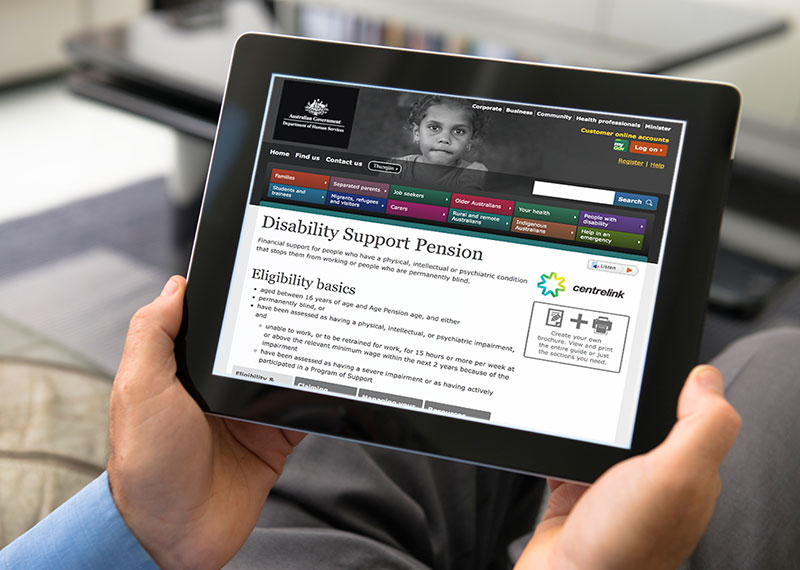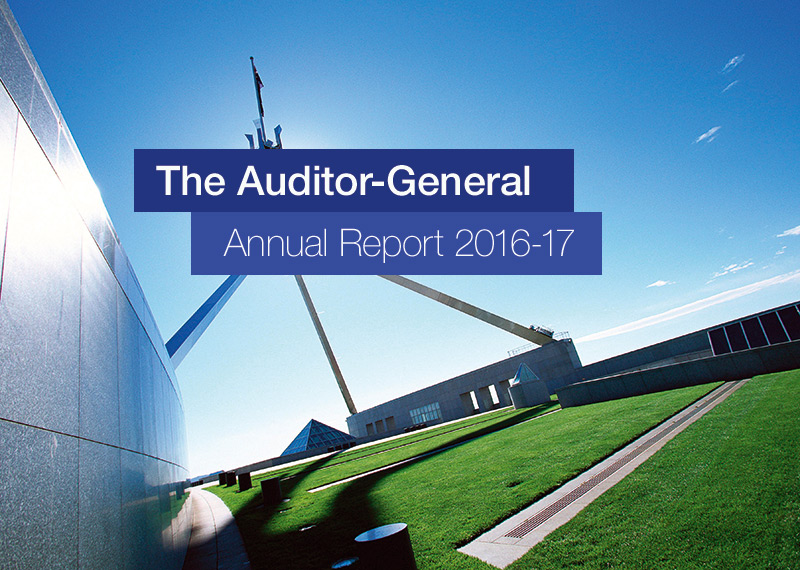Browse our range of reports and publications including performance and financial statement audit reports, assurance review reports, information reports and annual reports.
The Digital Switchover campaign aims to provide all Australians with a smooth transition from analogue to digital television. Phase Two is a two pronged approach of multi-regional communications targeting the broader Australian population, combined with further targeted communications in each switchover area prior to the analogue signals being switched off. The first region to switchover is the Mildura/Sunraysia region on the 30 June 2010. Tailored local communications will be targeted to this region from January 2010 until 2 weeks past the switchover date.
The campaign's objective is to raise awareness and understanding of the Secure and Sustainable Pension reforms announced in the 2009-10 Budget measures, and in particular how they relate to the individual circumstances of current pension recipients for whom English is not a convenient language.
The campaign's objective is to inform job seekers and employers of the change from the Job Network system to Job Services Australia.
The campaign for the National STI Prevention Program is designed to inform young Australians aged 15-29 years about the transmission, symptoms, treatment and prevention of STIs, and encourage safe sexual behaviour, to contribute to a reduction in the prevalence of sexually transmissible infections among this age group.
The campaign's objectives are to raise awareness of the harms and costs to young people, their families, communities and society associated with drinking to intoxication, to encourage young people and their parents to question the acceptability and impact of intoxicated behaviour, to highlight the influence that parental attitudes to alcohol misuse and adult behaviour and drinking to intoxication can have on others and provide referral and support information for those who recognise a need to seek help.
The objectives of the campaign are to increase knowledge and awareness, among people for whom English is not a convenient language, of the Education Tax Refund, the need to keep receipts, eligibility requirements, and how to claim the refund, with the overall objective of encouraging eligible Australians to make a claim for a rebate.
This phase of the campaign (phase two) is designed to communicate information and raise awareness about the First Home Owners Boost amongst potential first home buyers for whom English is not a convenient language.
The objectives of the campaign are to increase knowledge and awareness of the Education Tax Refund, the need to keep receipts, eligibility requirements, and how to claim the refund, with the overall objective of encouraging eligible Australians to make a claim for a rebate.
The campaign's objectives are to raise awareness, among those for whom English is not a convenient language, of the harms and costs to young people, their families, communities and society associated with drinking to intoxication, to encourage young people and their parents to question the acceptability and impact of intoxicated behaviour, to highlight the influence that parental attitudes to alcohol misuse and adult behaviour and drinking to intoxication can have on others and provide referral and support information for those who recognise a need to seek help.
The Economic Security Strategy (ESS) campaign is intended to inform the community of aspects of the Australian Government's response to the global financial crisis. This component of the campaign is designed to raise awareness, among those for whom English is not a convenient language, of the financial assistance available, in the form of lump sum payments, and of access and eligibility requirements.
The ABHI campaign is an information campaign, largely in cooperation with other states (excl Victoria) which promotes improved public health and reduced incidence of chronic disease. This component of the campaign takes a culturally relevant approach and includes advertising content and messages delivered through Indigenous media channels.
The Economic Security Strategy (ESS) campaign is intended to inform the community of aspects of the Australian Government's response to the global financial crisis. This campaign is designed to raise awareness of the financial assistance, in the form of lump sum payments, including access and eligibility requirements. Phase One is targeted at over five million pensioners, carers, seniors, people with a disability, veterans and families.
The ABHI campaign is an information campaign, largely in cooperation with other states (excl Victoria) which promotes improved public health and reduced incidence of chronic disease. The campaign aims to update public perceptions on lifestyle choices and risk factors leading to obesity and resultant disease. It is anticipated that people will take positive action to be more active and modify their diet, leading to a reduction in instances of diseases.
The audit objective was to assess whether Services Australia appropriately managed risks to operating the current welfare payment system and appropriately prepared to transition to the future system.
Please direct enquiries through our contact page.
The objective of this audit was to examine the extent to which the Department of Infrastructure and Regional Development, now the Department of Home Affairs (the Department) has implemented the recommendations made by the ANAO in Audit Report #5 2016–17, Passenger Security Screening at Domestic Airports.
Please direct enquiries through our contact page.
This report complements the Interim Report on Key Financial Controls of Major Entities financial statement audit report published in June 2019. It provides a summary of the final results of the audits of the Consolidated Financial Statements for the Australian Government and the financial statements of Australian Government entities for the period ended 30 June 2019.
Please direct enquiries through our contact page.
The objective of this follow-up audit was to assess the extent to which APRA has implemented recommendations regarding the supervisory framework and cross-border banking made in ANAO's 2001 audit of bank prudential supervision.
The objective of the audit was to assess the effectiveness of Airservices’ contract management for the OneSKY program.
Please direct enquiries through our contact page.
The objective of the audit was to assess the effectiveness of the department’s management of non-compliance with the Therapeutic Goods Act 1989 for unapproved therapeutic goods.
Please direct enquiries through our contact page.
The objective of the audit was to assess the adequacy of selected Australian Government entities’ practices and procedures to manage business continuity. To conclude against this objective, the ANAO adopted high-level criteria relating to the entities’ establishment, implementation and review of business continuity arrangements.
Please direct enquiries relating to reports through our contact page.
The objective of this audit was to examine the effectiveness of the National Indigenous Australians Agency’s management of provider fraud and non-compliance risks.
Please direct enquiries through our contact page.
The objective of this audit was to assess the effectiveness of the Department of Education’s design and implementation of programs and initiatives to improve the access and participation of regional and remote students to higher education.
Please direct enquiries through our contact page.
The audit objective was to assess the Department of Social Services and the Department of Human Services’ administration of Disability Support Pension eligibility and review processes.
Please direct enquiries relating to reports through our contact page.
The objective of the audit was to assess the effectiveness of Department of Defence's procurement and implementation of the myClearance system to date.
Please direct enquiries through our contact page.
The objective of this follow up audit was to examine Customs' implementation of the eight recommendations in the ANAO Report No.16 2004–05 and the two related recommendations from JCPAA Report 404. The audit has had regard to issues affecting the implementation of the recommendations and has taken into account changed circumstances and new administrative arrangements since the previous audit.
The objective of the audit was to assess the Department of Social Services’ (Social Services) implementation and evaluation of the Cashless Debit Card trial.
Please direct enquiries through our contact page.
Implementation of ANAO and Parliamentary Committee Recommendations — Education and Health Portfolios
The audit objective was to examine whether selected entities in the Health and Education portfolios implemented the Joint Committee of Public Accounts and Audit and other parliamentary inquiry report recommendations and agreed ANAO performance audit recommendations.
Please direct enquiries through our contact page.
The objective of the audit was to assess the effectiveness of the administration of the Smart Grid, Smart City Program, including the establishment, implementation and ongoing management of the program.
Please direct enquiries relating to reports through our contact page.
The objective of the audit was to assess the effectiveness of the ATO’s administration of external debt collection arrangements.
The audit reviewed the Australian Customs Service (Customs) fraud control arrangements. The audit objective was to assess whether Customs has implemented appropriate fraud control arrangements consistent with the Commonwealth's Fraud Control Guidelines and the administrative effectiveness of these arrangements.
Mr P.J. Barrett (AM) - Auditor-General for Australia, presented at the Association of Risk and Insurance Managers of Australasia - South Australia Chapter
The audit reviewed the processes involved in the sale of one-third of Telstra. The objectives in auditing the sale were to assess the extent to which the Government's sale objectives were achieved; assess the effectiveness of the management of the share offer; assess whether the sale arrangements adequately protected the Commonwealth's interests; and facilitate improved administrative arrangements for future share offers.
The objective of the audit was to assess the effectiveness of the NDIA’s management of assistance with daily life supports.
Please direct enquiries through our contact page.
The objective of this audit was to assess the effectiveness of Services Australia's management of social security and welfare debt.
Please direct enquiries through our contact page.
The objective of this audit was to assess the effectiveness of Comcare’s administration of claims for Australian Government entities under its workers’ compensation scheme.
Please direct enquiries through our contact page.
Mr P.J. Barrett (AM) - Auditor-General for Australia, presented at a Seminar for ANAO staff on Working with Parliamentary Committees. Parliamentary Education Office. The Commonwealth Parliament. Canberra
Mr P.J. Barrett (AM) - Auditor-General for Australia, presented to the Australian Society of CPAs, Canberra
The objective of this audit was to assess how effectively the Defence Science and Technology Group (DSTG) administers the science and technology work it undertakes for the Australian Defence Organisation.
Please direct enquiries relating to reports through our contact page.
The objective of this audit was to examine the effectiveness of DAFF’s administration of the Digital Services to Take Farmers to Markets (TFTM) program.
Please direct enquiries through our contact page.
The objective of this audit was to examine whether the selected entities within the Attorney-General’s portfolio have implemented all agreed recommendations from parliamentary committee and Auditor-General reports within the scoped timeframe.
Please direct enquiries through our contact page.
The audit objective was to assess the effectiveness of the management of the Australian Public Service (APS) workforce in implementing the Australian Government’s COVID-19 priorities.
Please direct enquiries through our contact page.
The audit objective was to assess the effectiveness of the Department of the Prime Minister and Cabinet’s administration of the IA framework to enable well-informed and transparent Australian Government decision-making.
Please direct enquiries through our contact page.
The objective of this audit was to assess the effectiveness of the selected entities’ implementation of arrangements for managing cyber security incidents in accordance with the Protective Security Policy Framework (PSPF) and relevant ASD Cyber Security Guidelines.
Please direct enquiries through our contact page.
The audit objective was to assess the effectiveness of the department’s strategic procurement of water entitlements to meet the Bridging the Gap target under the Basin Plan.
Please direct enquiries through our contact page.
The objective of the audit was to assess the effectiveness of the Australian Taxation Office’s administration of capital gains tax for individual and small business taxpayers.
Please direct enquiries relating to reports through our contact page.
The objective of the audit was to assess the effectiveness of the Department of the Treasury’s design and implementation of the Measuring What Matters framework.
Please direct enquiries through our contact page.
The objective of the audit was to assess the effectiveness of the operations of the boards of four corporate Commonwealth entities in managing conflicts of interest.
Please direct enquiries through our contact page.
The audit objective was to assess the effectiveness of the administration of the National Housing Finance and Investment Corporation (NHFIC).
Please direct enquiries through our contact page.
The audit objective was to assess whether the Department of Home Affairs is effectively managing the Civil Maritime Surveillance Services contract.
Please direct enquiries through our contact page.
This annual report documents the performance of the Australian National Audit Office (ANAO) in the financial year ending on 30 June 2017. The report addresses all applicable obligations under the Public Governance, Performance and Accountability Act 2013 (PGPA Act); the Public Governance, Performance and Accountability Rule 2014 (PGPA Rule); the Auditor-General Act 1997; the performance measures set out in the outcome and programs framework in the ANAO’s 2016–17 Portfolio Budget Statements (PBS) and the ANAO 2016–20 Corporate Plan and annual reporting requirements set out in other relevant legislation.
Please direct enquiries relating to annual reports through our contact page.
The objective of the audit was to examine the effectiveness of the Department of Defence’s planning, budgeting and implementation of an electronic health records solution for Defence personnel.
Please direct enquiries relating to reports through our contact page.
The objective of the audit was to assess the Department of Agriculture and Water Resources' establishment and administration of the Farm Finance and Drought Concessional Loans programs.
Please direct enquiries relating to reports through our contact page.
The objective of the audit was to assess whether Defence effectively managed the procurement process for services related to the recruitment of personnel to the ADF and the introduction of a new service provider.
The objective of this audit was to assess and report on the progress being made by Government agencies in achieving better practice in green office procurement and sustainable office management. The scope of the audit included agencies incorporated under the Financial Management and Accountability Act 1997 as well as a sample of bodies incorporated under the Commonwealth Authorities and Companies Act 1997. Sixty-three agencies were included in an audit survey. Detailed validation was carried out in nine of these agencies.
The objective of the audit was to examine the implementation of the annual performance statements requirements under the Public Governance, Performance and Accountability Act 2013 and the enhanced Commonwealth performance framework.
Please direct enquiries relating to reports through our contact page.
The objective of the audit was to assess the effectiveness of the Australian Taxation Office’s procurement of IT managed services.
Please direct enquiries through our contact page.
The objective of this audit was to assess the effectiveness of the Department of Health’s administration of the Community Health and Hospitals Program.
Please direct enquiries through our contact page.
The objective of the audit was to assess the effectiveness of the Department of Education, Skills and Employment in managing the integrity of payments to employment service providers.
Please direct enquiries through our contact page.
The objective of this audit was to assess the effectiveness of NBN Co Limited’s (NBN Co’s) strategies to manage its transition from building to operating the national broadband network.
Please direct enquiries through our contact page.
The objective of the audit was to assess the effectiveness of the Department of Social Services’ (DSS’s) and Services Australia’s management of the accuracy and timeliness of welfare payments.
Please direct enquiries through our contact page.


































